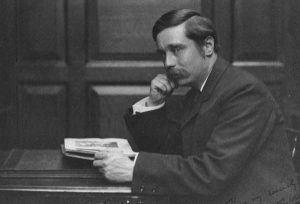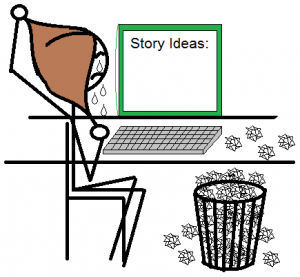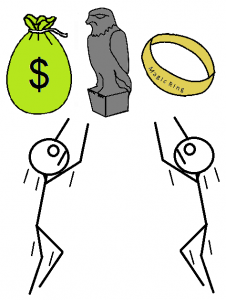Steven R. Southard's Blog, page 54
September 25, 2016
Happy Birthday, H.G. Wells!
Science Fiction pioneer H.G. Wells was born September 21, 1866, 150 years ago. Although he died in 1946, his works live on and inspire us today.
The novels of his I’ve read include The Time Machine, The Island of Dr. Moreau, The Invisible Man, The War of the Worlds, The First Men in the Moon, and The Sea Lady. Most of those remain classics today.

H.G. Wells
As readers of my blog know, my main author-crush is with Jules Verne, but Wells gave us several archetypal story themes and ideas that Ve...
September 18, 2016
Author Mission Statements and Strategic Plans
Businesses have mission statements and strategic plans. As a writer, shouldn’t you have them also? After all, writing is your business. Let’s see if these tools are right for you.
First, what are they? A mission statement is different from a strategic plan. A mission statement is a written declaration of what your business is striving to be, a vision of its intended future. It embodies the goal and vision of what the business seeks to become. It is bold, imaginative, and inspiring.
 A strategi...
A strategi...
September 12, 2016
Are All the Good Story Ideas Taken Already?
You’d like to write a story, but every time you think of an idea, you realize someone else wrote that one already. You figure all the good story ideas are used up. That’s it. There are no more. The last original novel has been written.
I don’t think so. New books, movies, and TV shows are coming out all the time.
 No, you protest. Those aren’t new. They’re just rehashes or remakes of old ideas, with some new flair added. They’re just old stories brought into modern times, well-used story lines...
No, you protest. Those aren’t new. They’re just rehashes or remakes of old ideas, with some new flair added. They’re just old stories brought into modern times, well-used story lines...
September 4, 2016
Do You Know the MacGuffin Man?
What is a MacGuffin, do you want one in your story, and if so, how do you incorporate one? Read on to find out about this literary term.
 Simply put, a MacGuffin is the protagonist’s goal. It can also be the goal of the antagonist as well. Perhaps they’re both pursuing it, or seeking to prevent the other from having it. It can be a tangible object, or an abstract idea.
Simply put, a MacGuffin is the protagonist’s goal. It can also be the goal of the antagonist as well. Perhaps they’re both pursuing it, or seeking to prevent the other from having it. It can be a tangible object, or an abstract idea.
Examples of MacGuffins in literature and film include the falcon figurine in Dashiell Hammett’s The Maltese Falcon, the witch’...
August 28, 2016
What Is It With Authors and Their Pets?
Many authors have pets. I thought I’d speculate why that’s so.

by Alvesgaspar

by Habj
I did a little online research and came up with the following table of authors, their pet type and breed, and the pet name or names, if known. For the data in the table, I’m grateful to the bloggers here, here, and here.
Author Pet Type-Breed Pet Name(s) Michel de Montaigne Cat Samuel Johnson Cat Hodge Elizabeth Barrett Browning Dog – Cocker Spaniel Flush Edgar Allan Poe Cat Catterina Char...August 21, 2016
Yes, You Do Have Time to Write
You say you’d like to be a writer, but you’re too busy; you just can’t find the time. I think I can help you find some time, but maybe that is not your real problem.
First, let’s look at your schedule. No, don’t spend a month or even a week writing down what you do; this is a mental exercise, so we’ll do it from memory. I see each of your days has 24 hours, and each hour has 60 minutes. That’s good, and those numbers aren’t any smaller than for all the greatest authors in history. In fact, th...
August 14, 2016
Shunning the Shaggy Dog Story
Someday you might get a comment back from your critique group or an editor declaring your submitted manuscript to be a “shaggy dog story.” What is that, and is it good or bad?
Wikipedia defines a shaggy dog story as a very long tale, with drawn-out explanations of irrelevant events, culminating in a pointless ending. If you’ve written what others consider a shaggy dog story, that’s not a good thing.

No Shaggy Dog Stories
The shaggy dog works slightly better, if at all, in joke form. There’s a...
August 7, 2016
Building Your Author Website
You’ve heard authors need websites, but you don’t know how to create one. Read on, and learn.
First, it’s not true that you need a website. You do need an online presence that shows you to be an author. That can consist of accounts on Facebook, Google+, Twitter, etc. However, I’d guess most authors have their own website.
 A website does at least the following things for you:
A website does at least the following things for you:
July 31, 2016
The Hero’s Journey, Oversimplified
The Hero’s Journey is one of the most basic plot types in literature. In 2013, author John Green discussed the hero’s journey in his commencement address at Butler University. In my view, he presented an incomplete view.

Simplified Version of Campbell’s Hero Journey
In 1949, Joseph Campbell introduced his analysis of the hero’s journey in his book, The Hero with a Thousand Faces. Campbell’s analysis was a complex one, with no less than seventeen stages of the journey.
At the Butler commenceme...
July 24, 2016
In the Mood, Revisited
Some time ago, I posted about how to get yourself in the mood to write. Today I’ll come at it from a different slant and suggest you should write even when you’re not in the right mood.
We’ve all been there. There’s a task (say, writing) you should do, and it’s now the allotted time for it. However, you’re not in the mood. Something else has happened to put your mind in the wrong frame.
Typically, it’s some strong, negative emotion like anger or sadness. Someone or something has upset you and...



